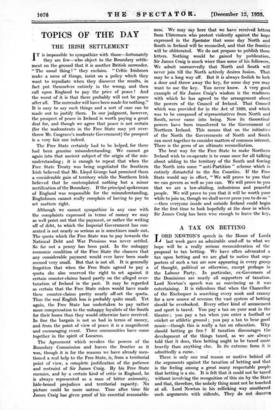TOPICS OF THE DAY
THE IRISH SETTLEMENT
is impossible to sympathize with those—fortunately -I- they are few—who object to the Boundary settle- ment on the ground that it is another British surrender. " The usual thing ! " they exclaim. " Celtic Irishmen make a mess of things, insist on a policy which they want to repudiate when they discover the results, in fact put themselves entirely in the wrong, and then call upon England to pay the price of peace ! And the worst of it is that there probably will not be peace after all. The surrender will have been made for nothing." It is easy to say such things and a sort of case can be made out to justify them. In our judgment, however, the prospect- of peace in Ireland is worth paying a great deal for, and though we agree that peace is not certain (for the malcontents in the Free State may yet over- throw Mr. Cosgrave's moderate Government) the prospect is a very fair one indeed.
The Free State certainly had to be helped, for there had been genuine misunderstanding. We cannot go again into that ancient subject of the origin of the mis- understanding ; it is enough to repeat that when the Free State Treaty was being negotiated the Southern Irish believed that Mr. Lloyd George had promised them a considerable gain of territory while the Northern Irish believed that he contemplated nothing but a minor rectification of the Boundary. If the principal spokesman of England was responsible for the misunderstanding, Englishmen cannot really complain of having to pay to set matters right.
Although we cannot sympathize in any case with the complaints expressed in terms of money we may as well point out that the payment, or rather the writing off of debt, to which the Imperial Government has con- sented is not nearly so serious as is sometimes made out. The quota which the Free State was to pay towards the National Debt and War Pensions was never settled. So far not a penny has been paid. In the unhappy economic condition of the Free State the chances that any considerable payment would ever have been made seemed very small. But that is not all. It is generally forgotten that when the Free State agreed to pay a quota she also reserved the right to set against it certain counter-claims based partly on the alleged over- taxation of Ireland in the past. It may be regarded as certain that the Free State rulers would have made these counter-claims pretty nearly off-set the quota. Thus the real English loss is probably quite small. Yet again, the Free State has undertaken to pay rather more compensation to the unhappy loyalists of the South for their losses than they would otherwise have received. In fine the bargain is, not so bad in terms of money, and from the point of view of peace it is a magnificent and encouraging event. Three communities have come together in the spirit of Locarno.
The Agreement which revokes the powers of the Boundary Commission and leaves the frontier as it was, though it is for the reasons we have already men- tioned a real help to the Free State, is, from a territorial point of view, a complete justification of the patience and restraint of Sir James Craig. By his Free State enemies, and by a certain kind of critic in England, he is always- represented as a man of bitter animosity, hide-bound prejudices and territorial rapacity. No picture could be more untrue. Time after time Sir James Craig has given proof of his- essential reasonable- ness. We may say here that we have received letters from Ulstermen who protest violently against the hope expressed in the Spectator that some day North and South in Ireland will be reconciled, and that the frontier will be obliterated. We do not propose to publish these letters. Nothing would be gained by publication. Sir James Craig is much wiser than some of his followers. We admit unreservedly that North and South will never join till the North actively desires fusion. That may be a long way off. But it is always foolish to lock a door and throw away the key, for some day you may want to use the key. You never know. A very good example of Sir James Craig's wisdom is the readiness with which he has agreed to the arrangement about the powers of the Council of Ireland. That Council which was provided for in the Act of 1920, and which was to be composed of represeetatives from North and South, never came into being. Now its theoretical powers have been transferred to the Government of Northern Ireland. This means that on the initiative of the North the Governments of North and South can meet together to consider matters of common interest. There is the germ of an ultimate reconciliation.
The best way for the Free State to make Northern Ireland wish to co-operate is to cease once for all talking about adding to the territory of the South and forcing the North into some " anti-Partition " scheme which is entirely distasteful to the Six Counties. If the Free State would say in effect, " We will prove to- you that we can govern as well as you can. We will prove to you that we are a law-abiding, industrious and peaceful people. We will prove to you that it will be worth your while to join us, though we shall never press you to do so " —then everyone inside and outside Ireland could begin for the first time to look hopefully at the door in which Sir James Craig has been wise enough to leave the key.






















































 Previous page
Previous page